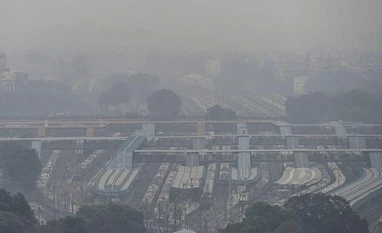The air quality largely remained "very poor" in parts of Gautam Buddh Nagar, Ghaziabad, Gurgaon and Faridabad while it reached "severe" levels at places in the National Capital Region on Thursday, according to a government agency.
Concentration of major air pollutants PM 2.5 and PM 10 during the morning hours also remained high in the four immediate neighbouring districts of Delhi, according to the air quality index (AQI) maintained by the Central Pollution Control Board (CPCB).
According to the index, an AQI between zero and 50 is considered 'good', 51 and 100 'satisfactory', 101 and 200 'moderate', 201 and 300 'poor', 301 and 400 'very poor', and 401 and 500 'severe'.
In Ghaziabad, an AQI of 418 was recorded at the station in Loni, followed by 367 at Vasundhara, 364 at Indirapuram and 354 at Sanjay Nagar, according to CPCB data at 8 pm.
In Gautam Buddh Nagar's Noida, the AQI was 395 at Sector 1, 374 at Sector 62 and 357 at Sector 116, while the station at Sector 125 showed "insufficient" data for the last 24 hours.
In Greater Noida, an AQI of 423 was recorded at Knowledge Park V and 391 at Knowledge Park III, according to the CPCB figures.
More From This Section
In Gurgaon, the AQI was 421 at Sector 51, 407 at Vikas Sadan, 345 at Teri Gram and 333 at NISE Gwal Pahari, it showed.
In Faridabad, the AQI was 394 at Sector 30, 367 at Sector 16A, 356 at New Industrial Town and 339 at Sector 11 at 8 pm.
As a possible health impact, the CPCB states an AQI in the "very poor" category can lead to respiratory illness on prolonged exposure, while "severe" can affect healthy people and seriously impact those with existing diseases.
The Graded Response Action Plan (GRAP) has also been implemented in the Delhi-NCR from October 15 to check air pollution, which spikes around this time of the year.
)